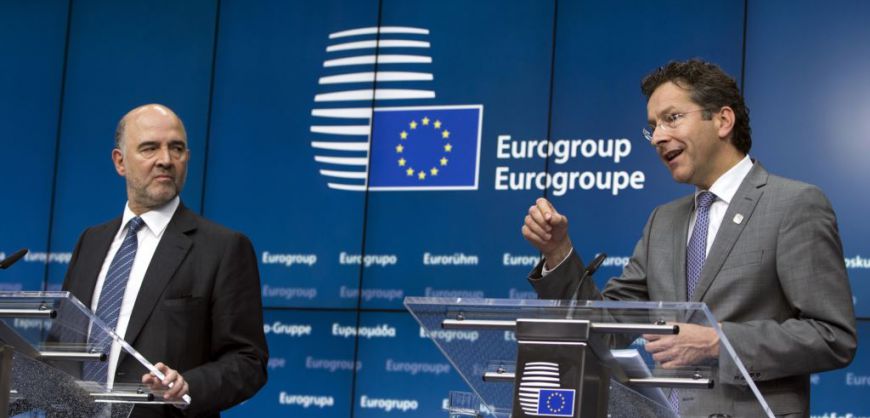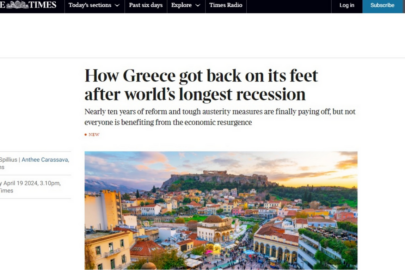By Eurogroup Head J. Dijsselbloem
Good evening and welcome to the Eurogroup press conference.
First of all we discussed the Bank Recovery and Resolution Directive (BRRD) and specifically the setting up of the Single Resolution Board (SRB). Ms Elke König was with us and informed us on all the preparations they are doing to have the SRB up and running on the 1 January 2016. A lot of work has to be done – the organisation has to be put up, rules and regulations have to be designed etc., so we were very impressed by the work she has done so far and hope to welcome her in the Eurogroup on a more regular basis. There were two issues that she draw to our attention:
1. Setting up of the national credit lines. That will also be on the agenda of tomorrows Economic and Financial Affairs Council;
2. Timely ratification of the Intergovernmental Agreement and transposition of the BRRD by all the Member States.
I am happy to inform you that the Dutch Senate will vote on the last part of legislation tomorrow (10 November 2015) so knock on wood. Then we will have our work done, and all that in preparation for 1 January 2016, of course.
The second issue on our agenda was Greece. We were informed by the Commission, the ECB and the IMF on the state of play, and by the ESM. A lot of progress and work has been done in terms of programme implementation, further development and it has been a very cooperative process. This has been emphasised by all sides. So that was very good news.
We’ve also taken stock of the ongoing recapitalization exercise with Greek banks. There too a lot of work has been done and the size of the recapitalization is smaller than expected earlier, and actually the speed of the process is also going quite smoothly so far. The next thing to do is to have all the financial sector measures in place before the completion of the recapitalisation process. Our Greek colleague Euclid Tsakalotos gave his commitment to get that done. There are open issues which you may have heard about which have to do with nonperforming loans, and more specifically household insolvency. So more work needs to be done to get an agreement also on those issues. Implementation needs to be finished over the course of the coming week. All of that is necessary to finalize the process of the recapitalization. As you remember €10 billion has already been put in a segregated account in the ESM, which is ready if needed and when needed for the recapitalization process, but of course the agreed conditions need to be met.
So there are two key issues – one is about the governance of the banks, and the other key issue still to be resolved is about household insolvency. So those conditions are to be met in the coming days. We have mandated the Euro Working Group to reconvene at the latest at the beginning of the next week to take stock of the compliance report from the institutions. Hopefully the whole first set will be implemented, but also some of the key issues regarding the governance of the banks will be put in place. And then at the beginning of the next week the EWG can assess that and come to a positive conclusion, which will then be followed by an ESM Board of Governance meeting because they in the end have to take the decisions to make available the €10 billion, or less if less is needed at that point. So that’s the process that we’ve outlined for the coming days and we are all committed to get that done in time.
Let me quickly mention a couple of other issues on our agenda. We were informed, on the basis of the autumn forecast, of the ongoing economic recovery in the euro area. The recovery will continue despite some global economic issues which we are all aware off. There was great consensus that at the same time we need to use this period and the benign circumstances to push forward structural reforms to get higher potential growth in the euro area.
On the future of the monetary union, we had an initial exchange of views on the follow-up to the 5 Presidents’ report. In October the Commission presented its first proposals on economic governance and today we had a first round of debate on that, and specifically on external representation. Not much I can say about that. It was a first round, and on some other issues like the Fiscal Board and the Competitiveness Authorities. The debate on those governance issues will be on the Ecofin agenda tomorrow, so we’ll pick up on that from there.
These were the main highlights from me.
By EU Commissioner P. Moscovici
Merci Jeroen.
J’ai effectivement informé l’Eurogroupe cet après-midi de l’état des discussions entre les institutions et la Grèce.
J’étais la semaine dernière à Athènes où j’ai eu des discussions constructives et utiles avec les autorités, dont le premier ministre Alexis Tsipras et Euclid Tsakalotos, que nous avons aussi eu le plaisir d’entendre aujourd’hui.
Je veux souligner à mon tour que la coopération avec les autorités grecques est vraiment bonne, qu’elle est tout à fait à la hauteur de celle que nous avons eue dans le passé avec les autres pays sous programme et qu’il y a une démarche coopérative et que nos équipes travaillent jour et nuit – et quand je dis jour et nuit, je ne n’exagère pas – pour aboutir à un accord sur les points encore ouverts.
Je veux dire trois choses.
La première, c’est que la quantité de mesures qu’il est prévu d’adopter pendant les premiers mois de ce programme est très importante et que celles qui ont déjà été adoptées sont loin d’être négligeables
La deuxième, c’est qu’une grande majorité des milestones dont on discute actuellement a déjà été réalisée ou est en cours de finalisation, j’ai pu expliquer que si on prenait déjà ce qui était réalisé ou en cours de finalisation, cela représentait tout de même 80 % de l’ensemble et il y a encore une dizaine de % qui sont dans la bonne voie. Donc, nous avons fait des progrès incontestables et je crois que l’état d’esprit général était pour le constater et pour souhaiter que cela avance et cela avance dans la bonne direction.
Il reste évidemment certains points encore à clôturer et il faudra que tout le monde fasse un dernier effort pour atteindre cet objectif dans les prochains jours.
Jeroen a été très précis sur la question première qui est la question de la recapitalisation des banques, il y en a une autre qui est liée, c’est la question des crédits non-performants, qui est essentielle pour faire en sorte que le secteur bancaire soit solide et pour permettre que le crédit abonde l’économie réelle.
C’est un problème et un défi qui est très important et pas seulement pour la Grèce, mais aussi pour d’autres pays dans l’Union européenne et la zone euro.
Un aspect particulier, c’est la loi sur les foreclosures sur laquelle il y a encore des discussions assez intenses qui se déroulent et nous devons trouver là un équilibre, une solution équilibrée qui protège les plus vulnérables, car c’est notre intention commune, il ne peut pas y avoir des gens qui se retrouvent sans toit et en même temps nous devons éviter que certains abusent des protections qui sont en place et c’est la raison pour laquelle nous cherchons une solution. Nous travaillons et nous continuons à travailler.
Je suis confiant dans le fait qu’on puisse trouver une solution acceptable pour tous et qui soit surtout efficace. Et ces deux questions, recapitalisation des banques et foreclosure legislation sont évidemment étroitement liées.
Sur le plan de la situation économique et budgétaire, j’ai profité de l’occasion d’aujourd’hui pour présenter à nos collègues les prévisions d’automne de la Commission européenne qui avaient déjà été développées la semaine dernière et j’ai insisté sur l’aspect zone euro.
As you are aware, the forecast sees the moderate recovery of the euro area and the EU continuing, despite slower growth in emerging market economies and world trade.
I just record the figures. The euro area economy is expected to grow by 1.6% this year and then by 1.8% in 2016 and 1.9% in 2017.
The growth outlook continues to benefit from tailwinds such as low oil prices, QE and, to some extent, the euro’s exchange rate, which is the consequence of the accommodative ECB monetary policy as well as the broadly neutral fiscal stance, which should go on.
I emphasised that domestic demand is projected to strengthen on the back of rising disposable income, improving employment and the gradual fading of legacy problems such as deleveraging and NPLs, while investment should also progressively pick up.
Finally, I pointed out that an early simulation of the impact of the refugee influx suggests that the overall economic effects should be small but positive, although how positive depends on how well the new arrivals can be integrated into the workforce.
As Jeroen said on a third point, we had a first but quite extensive orientation debate today on the proposals which the Commission put forward to implement the recommendations set out in the Five Presidents’ Report on completing Europe’s Economic and Monetary Union.
The Commission looks forward to continuing this discussion over the coming months. We are already presenting some proposals and we are going to present more.
One word about Spain:
I informed the Eurogroup today of the main findings of the 4th post-programme surveillance mission to Spain, which the Commission carried out together with the ECB and the ESM.
The review report, which we will finalise in the coming weeks, makes a broad assessment of Spain’s economic and financial situation and fulfils the specific monitoring requirement of Spain’s macroeconomic imbalances under the Macroeconomic Imbalances Procedure (MIP).
Spain’s economy, labour market, current account and banking sector have all improved significantly, with the help of substantial reforms. GDP growth this year is expected to be 3.1%, significantly above than the euro area average, and private sector debt levels continue to come down in an orderly fashion.
Nevertheless, I also insisted on the fact that challenges remain and sound public finances and further reforms will be needed to consolidate Spain’s recent progress but this progress is of course undoubtable.
We also agreed with Jeroen that on basis of the forecast we will be able to adopt the opinion on the draft budgetary plans, which we do not talk about today, so that we have a discussion in a special Eurogroup when the time comes.




































